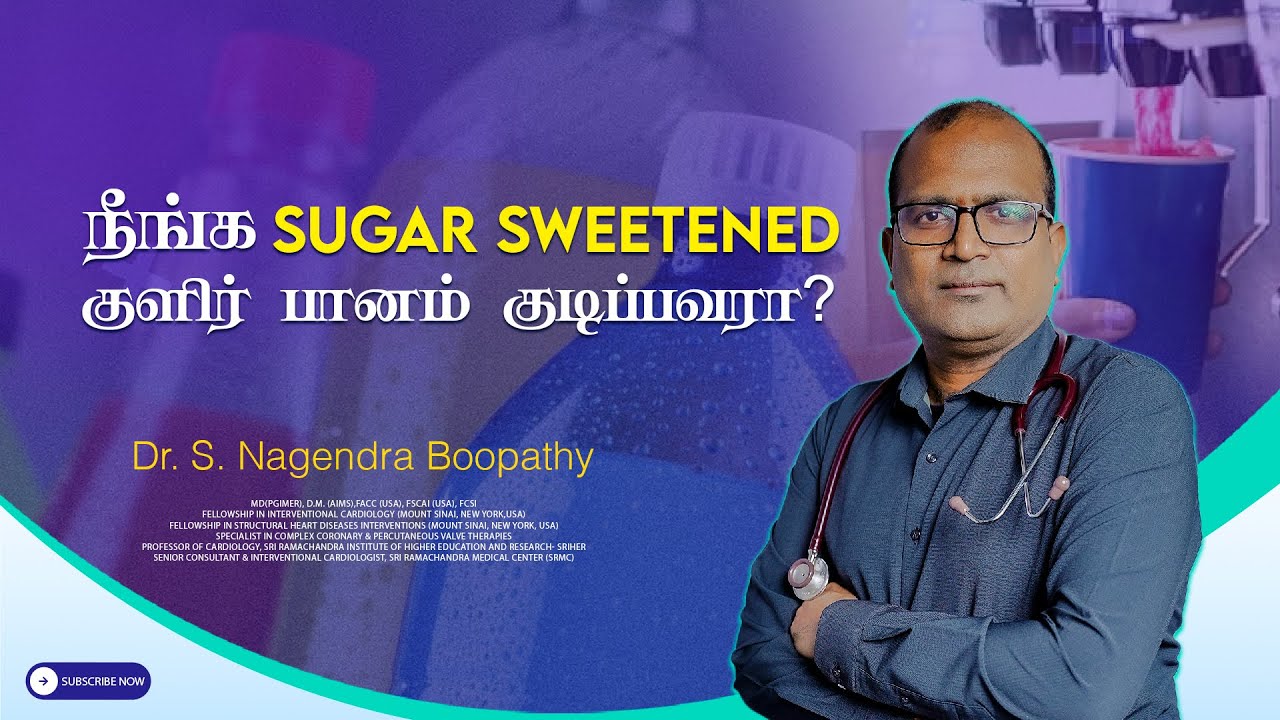Artificial sugar and sweetened beverages have become an integral part of many people’s daily diets worldwide. From sodas and processed fruit juices to sugar-laden coffee and tea, these sugary drinks are everywhere. While they may satisfy our sweet cravings, their impact on health is a growing concern. Dr. Nagendra Boopathy, a renowned cardiologist from Sri Ramachandra Medical College and Consultant at Dr. Boopathy’s Heart Care, sheds light on how these artificial sugars affect our bodies, particularly our heart and metabolic health.
In this article, we explore Dr. Boopathy’s expert insights on artificial sugars—their sources, health consequences, and why it is crucial to reconsider our consumption habits. We also discuss practical tips to reduce intake and maintain a healthier lifestyle.
Understanding Artificial Sugar and Sweetened Beverages
Artificial sugar, often referred to as added or refined sugar, is sugar that is artificially incorporated into food and drinks rather than naturally occurring. This includes the sugar added to colas, processed fruit juices, and many packaged beverages. Essentially, any drink that contains added sugar—be it coffee with sugar, tea with sugar, or sodas—is classified under sugar-sweetened beverages (SSBs).
Dr. Boopathy emphasizes that these sugar-sweetened beverages are a significant source of sugar consumption worldwide. The problem arises because people consume these drinks regularly, often without realizing the amount of sugar they are ingesting. This excessive intake can lead to serious health issues over time.
The Global Impact of Sugar-Sweetened Beverages
According to a global dietary database study referenced by Dr. Boopathy, researchers analyzed data from 184 countries to understand the impact of sugar-sweetened beverages on heart health and mortality. The findings revealed alarming statistics:
- 10% of the global sugar intake comes from sugar-sweetened beverages.
- 5% of heart-related illnesses are linked to the consumption of these sugary drinks.
- SSBs contribute to 20% of deaths caused by these conditions.
These numbers highlight the critical role that artificial sugar in beverages plays in the rise of heart diseases and metabolic disorders worldwide.
Health Risks Associated with Artificial Sugar
When we consume sugar in excess, it has a detrimental effect on multiple organs and systems in the body. Dr. Boopathy points out that sugar affects vital organs such as the eyes, kidneys, nerves, heart, and brain. The damage is not immediate but accumulates over time, leading to chronic conditions like:
- Metabolic Syndrome: A cluster of conditions including obesity, high blood pressure, insulin resistance, and abnormal cholesterol levels.
- Heart Disease: Excess sugar contributes to increased risk of coronary artery disease and other cardiovascular problems.
- Diabetes: High sugar intake disrupts glucose metabolism, increasing the risk of type 2 diabetes.
- Kidney Disease: Sugar overload strains kidney function and can lead to chronic kidney disease.
- Neurological Effects: High sugar consumption can impact nerve health and brain function.
Dr. Boopathy stresses that these health risks make it imperative to limit sugar intake, especially from artificial sources found in processed drinks.
The Nutritional Transition and Lifestyle Changes
One of the challenges we face today is the “nutritional transition” driven by globalization and Western lifestyle influences. Traditional diets are being replaced by processed foods and sugary beverages, especially in developing countries like India. This shift has led to an increase in metabolic syndrome and related diseases.
Dr. Boopathy points out that this transition is evident in everyday scenarios such as family outings where children and adults alike consume sodas and processed juices without much thought. This habitual consumption, especially during childhood and adolescence, sets the stage for long-term health issues.
Why Avoiding Artificial Sugar is Essential
Given the harmful effects of artificial sugars, Dr. Boopathy advises against regular consumption of sugar-sweetened beverages. Here are some key reasons to avoid them:
- Hidden Chemicals: Many processed drinks contain chemicals and additives that may further harm the body, beyond just the sugar content.
- Weight Gain and Obesity: Excess sugar contributes to increased calorie intake, leading to weight gain and obesity, which are risk factors for heart disease and diabetes.
- Metabolic Disruption: Artificial sugars interfere with normal metabolic processes, increasing the risk of metabolic syndrome.
- Long-Term Organ Damage: Continuous intake can damage organs such as the heart, kidneys, and brain.
Dr. Boopathy emphasizes the importance of educating children about the dangers of sugary drinks early on and cultivating habits that favor natural, healthy beverages instead.
Healthier Alternatives and Practical Tips
Instead of sugary drinks, Dr. Boopathy recommends several healthier alternatives to keep the body hydrated and nourished:
- Clean Water: Drinking clean, pure water is the best way to stay hydrated.
- Buttermilk: A traditional and nutritious drink that can replace sodas and processed juices.
- Fresh Tender Coconut Water: Natural and rich in electrolytes, it’s an excellent alternative.
- Homemade Fruit Infused Water: Adding slices of lemon, cucumber, or mint to water can provide flavor without added sugars.
Dr. Boopathy also advises moderation in the use of sugar even in coffee and tea. If sweetening is necessary, it should be done sparingly to avoid excessive sugar intake.
The Role of Moderation and Mindful Eating
One of the key messages from Dr. Boopathy is the importance of moderation. While completely avoiding sugar might be challenging, controlling the amount consumed is essential for maintaining good health. He quotes the wisdom of Valluvar, a revered Tamil poet, who said that one who eats moderately will live happily and healthily.
Mindful eating involves being aware of what we consume, understanding the impact of artificial sugars, and making conscious choices to protect our health. This practice can help prevent metabolic disorders, maintain a healthy weight, and reduce the risk of heart disease.
Conclusion
Artificial sugars and sugar-sweetened beverages pose a significant threat to global health, contributing to metabolic syndrome, heart disease, and premature death. Dr. Nagendra Boopathy’s insights highlight the urgent need to reduce consumption of these products and adopt healthier lifestyle choices.
By choosing natural hydration options, moderating sugar intake, and educating ourselves and our families about the dangers of artificial sugars, we can take important steps toward better health. Remember, prevention is always better than cure, and small changes today can lead to a healthier tomorrow.
Frequently Asked Questions (FAQs)
What exactly are sugar-sweetened beverages (SSBs)?
SSBs are drinks that have added sugars or artificial sweeteners. This includes sodas, processed fruit juices, sweetened coffee and tea, energy drinks, and many packaged beverages.
How do artificial sugars affect the heart?
Artificial sugars contribute to increased blood sugar levels, obesity, and metabolic syndrome, all of which increase the risk of heart diseases such as coronary artery disease and heart attacks.
Are processed fruit juices healthier than sodas?
Not necessarily. Many processed fruit juices contain added sugars and preservatives similar to sodas. Natural, fresh fruit juices without added sugar are a better option.
Can moderate consumption of sugar-sweetened beverages be safe?
While occasional consumption may not cause immediate harm, regular and excessive intake increases the risk of chronic diseases. Moderation and mindful consumption are key.
What are some healthier alternatives to sugary drinks?
Clean water, buttermilk, fresh tender coconut water, and homemade fruit-infused water are excellent alternatives that hydrate and nourish without added sugars.
How does sugar impact other organs besides the heart?
Sugar affects kidneys, nerves, eyes, and the brain, potentially leading to kidney disease, neuropathy, vision problems, and cognitive issues over time.
Is it better to avoid sugar entirely?
Complete avoidance might be difficult, but reducing added sugar intake and choosing natural sources of sweetness is beneficial for overall health.
Why is educating children about sugar consumption important?
Habits formed in childhood often continue into adulthood. Teaching children about the harms of sugary drinks helps prevent early onset of metabolic diseases and promotes lifelong healthy habits.




